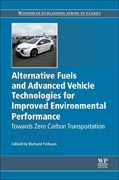
Alternative Fuels and Advanced Vehicle Technologies for Improved Environmental Performance: Towards Zero Carbon Transportation
Folkson, Richard
Most vehicles run on fossil fuels, and this presents a major emissions problem as demand for fuel continues to increase. Alternative Fuels and Advanced Vehicle Technologies gives an overview of key developments in advanced fuels and vehicle technologies to improve the energy efficiency and environmental impact of the automotive sector. Part I considers the role of alternative fuels such as electricity, alcohol, and hydrogen fuel cells, as well as advanced additives and oils, in environmentally sustainable transport. Part II explores methods of revising engine and vehicle design to improve environmental performance and fuel economy. It contains chapters on improvements in design, aerodynamics, combustion, and transmission. Finally, Part III outlines developments in electric and hybrid vehicle technologies, and provides an overview of the benefits and limitations of these vehicles in terms of their environmental impact, safety, cost, and design practicalities. Alternative Fuels and Advanced Vehicle Technologies is a standard reference for professionals, engineers, and researchers in the automotive sector, as well as vehicle manufacturers, fuel system developers, and academics with an interest in this field. Provides a broad-ranging review of recent research into advanced fuels and vehicle technologies that will be instrumental in improving the energy efficiency and environmental impact of the automotive sectorReviews the development of alternative fuels, more efficient engines, and powertrain technologies, as well as hybrid and electric vehicle technologies INDICE: 1 Introduction R. Folkson, University of Hertfordshire, UK Part I Alternative fuels, advanced additives and oils to improve environmental performance of vehicles 2 The role of alternative and renewable liquid fuels in environmentally sustainable transport R. J. Pearson and J. W. G. Turner, University of Bath, UK 3 Using alternative and renewable liquid fuels to improve the environmental performance of internal combustion engines: key challenges and blending technologies R. J. Pearson and J. W. G. Turner, University of Bath, UK 4 Alternative and renewable gaseous fuels to improve vehicle environmental performance M. Mintz, J. Han and A. Burnham, Argonne National Laboratory, USA 5 Electricity and hydrogen as energy vectors for transportation vehicles J. W. Sheffield and K. B. Martin, formerly of Missouri University of Science and Technology, USA and R. Folkson, University of Hertfordshire, UK 6 Advanced engine oils to improve the performance of modern internal combustion engines K. Howard, Lubrizol Ltd, UK 7 Advanced fuel additives for modern internal combustion engines J. Bennett, Afton Chemical Limited, UK Part II Improving engine and vehicle design 8 Internal combustion engine cycles and concepts J. D. Naber and J. E. Johnson, Michigan Technological University, USA 9 Improving the environmental performance of heavy-duty vehicles and engines: key issues and system design approaches Q. Xin and C. F. Pinzon, Navistar, Inc., USA 10 Improving the environmental performance of heavy-duty vehicles and engines: particular technologies Q. Xin and C. F. Pinzon, Navistar, Inc., USA 11 Advanced and conventional internal combustion engine materials L. L. Myagkov, Bauman Moscow State Technical University, Russia, K. Mahkamov, Northumbria University, UK, N. D. Chainov, Bauman Moscow State Technical University, Russia and I. Makhkamova, Northumbria University, UK 12 Advanced transmission technologies to improve vehicle performance S. N. Dogan, G. Henning, T. Gödecke, M. Sommer, K. Fronius, M. Krohn, J. Kiesel and J. Dorfschmid, Daimler AG, Germany 13 Sustainable design and manufacture of lightweight vehicle structures G. S. Daehn, The Ohio State University, USA 14 Improving vehicle rolling resistance and aerodynamics M. Juhala, Aalto University, Finland 15 Mechanical and electrical flywheel hybrid technology to store energy in vehicles K. Pullen and A. Dhand, City University London, UK 16 Hydraulic and pneumatic hybrid powertrains for improved fuel economy in vehicles Z. Filipi, Clemson University, USA 17 Integration and performance of regenerative braking and energy recovery technologies in vehicles P. Tawadros and N. Zhang, University of Technology, Sydney, Australia and A. Boretti,RMIT University, Australia Part III Electric/hybrid vehicle technologies 18 Hybrid drive train technologies for vehicles T. Hofman, Eindhoven University of Technology, The Netherlands 19 Battery technology for CO2 reduction N. M. Johnson, Ricardo, Inc., USA 20 Conventional fuel/hybrid electric vehicles M. Ehsani, Texas A&M University, USA 21 Pure electric vehicles K. T. Chau, The University of Hong Kong, People's Republic of China 22 Fuel-cell (hydrogen) electric hybrid vehicles B. G. Pollet, University of the Western Cape, South Africa, I. Staffell, Imperial College, UK, J. L. Shang, University of Birmingham, UK and V. Molkov, University of Ulster, UK
- ISBN: 978-0-85709-522-0
- Editorial: Woodhead Publishing
- Encuadernacion: Cartoné
- Páginas: 832
- Fecha Publicación: 21/03/2014
- Nº Volúmenes: 1
- Idioma: Inglés
